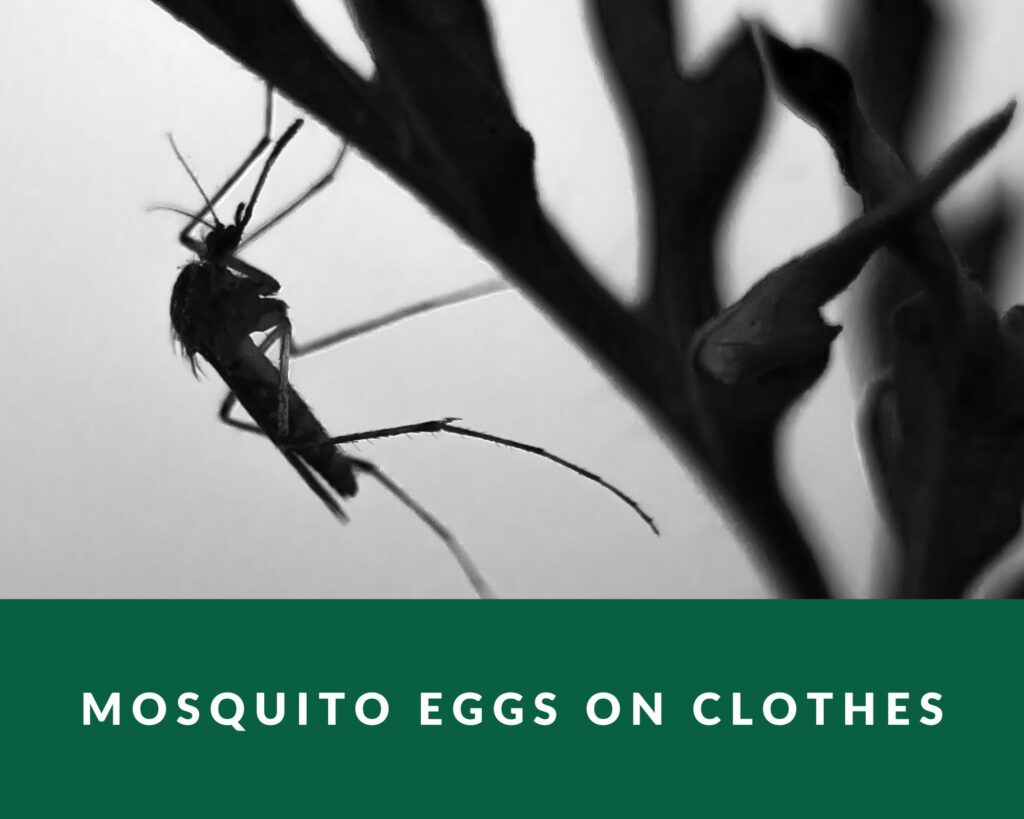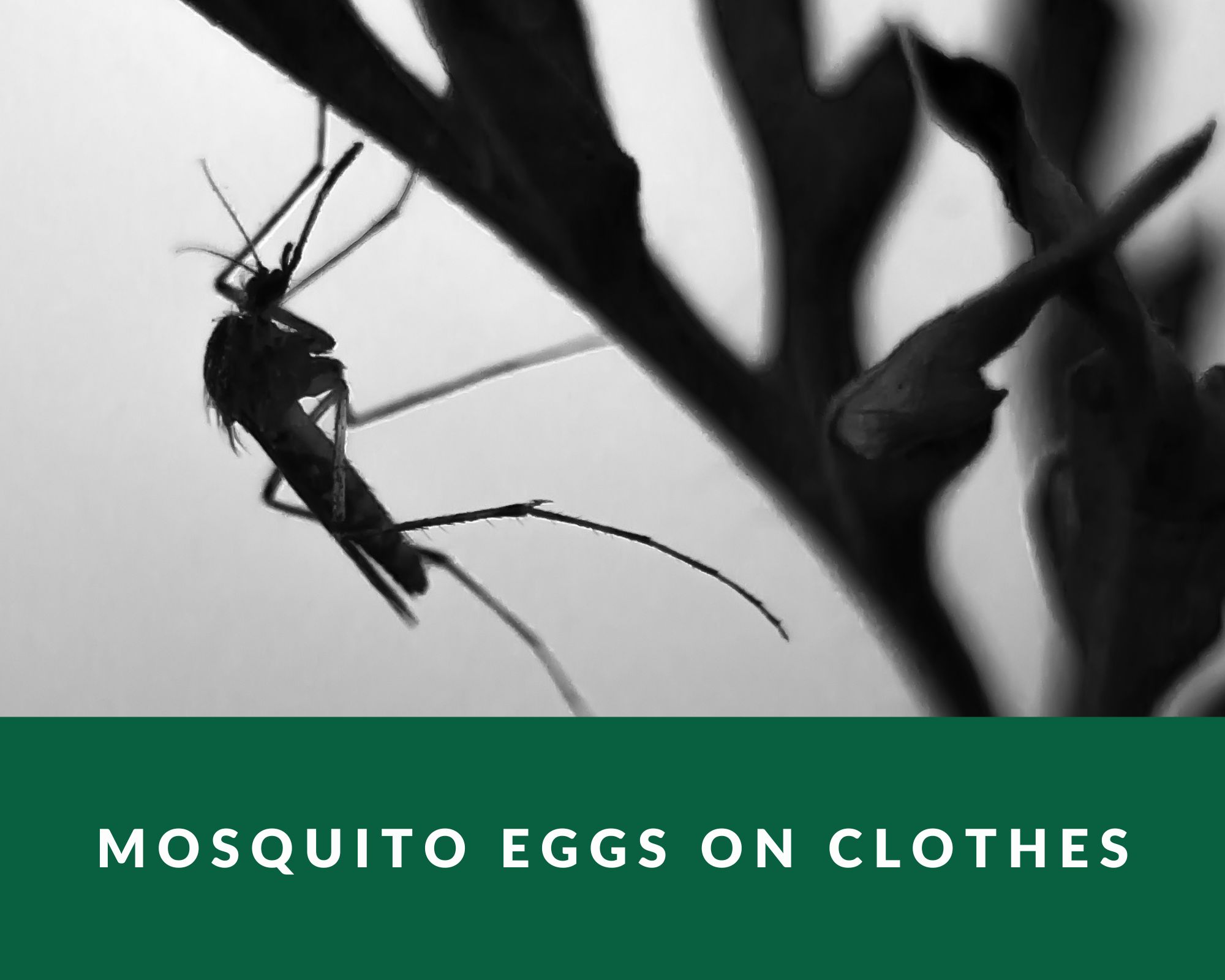Mosquito eggs on clothes
In addition to giving people itchy bites, mosquitoes can spread dangerous infections and viruses.
The egg stage is the first of the four stages in the life cycle of a mosquito, which has four phases overall.
This article, however, will concentrate on mosquito eggs on clothes, whether they can be on clothing or not, the types of clothing that mosquitoes are drawn to, and much more.

Mosquito poop on clothes
Mosquito eggs are elongated and measure around 1/4 inch long. The majority of the time, they are arranged in groups on the surface of bodies of still water, such as puddles, ponds, ditches, and other places where water collects.
The surface of the eggs is sleek and shiny, and they are often white or tan in color.
Some mosquito species lay their eggs on rafts that float, while others lay their eggs singly or in groups that are linked to water plants.
Do mosquitoes lay eggs on clothes?
Not at all. Mosquitoes do not lay eggs on clothes. There is no chance of mosquitoes depositing their eggs on clothing.
Mosquitoes typically lay their eggs in stagnant water or areas with high moisture content like ponds, puddles, or even abandoned tires.
The eggs hatch into larvae, which then develop into pupae and eventually emerge as adult mosquitoes.
Can Mosquitoes Bite Through Clothes?
Mosquitoes can bite through clothes. How can mosquitoes bite through clothes you may ask?
Mosquitoes have sharp, long mouthparts known as proboscis that can pierce lightweight fabrics. Such fabrics include spandex, flimsy cotton, silk or even linen as easily as they do skin.
According to Healthline, mosquitoes are attracted to heat, and dark colors hold in heat more than light colors do.
While others claim that there is little to no difference.
Consequently, you will attract mosquitoes because of your increased visibility and the warmth and carbon dioxide you’re emitting.
What clothes prevent mosquito bites
Long-sleeved shirts and pants
Long-sleeved shirts and pants cover most of your skin, making it difficult for mosquitoes to bite you.
Light-colored clothing
Mosquitoes are attracted to dark colors, so wearing light-colored clothing can help to deter them.
Clothing with a tight weave
Tight-woven clothing is more difficult for mosquitoes to bite through than clothing with a loose weave.
Clothing treated with insect repellent
Clothing that has been treated with insect repellent can help to keep mosquitoes away.
What is the best clothing to avoid mosquito bites?
There is no proven data that wearing clothing treated with permethrin can completely keep you from mosquito bites.
This is because Permethrin is an insecticide, designed to kill or incapacitate mosquitoes on contact, not necessarily a mosquito repellent.
The combination of DEET and permethrin-treated clothing may provide close to 100 percent effectiveness against mosquitoes.
What does it look like when mosquitoes lay eggs?
Mosquito eggs on clothes look like black dirt. Adult, female mosquitoes lay eggs on the inner walls of containers with water, above the waterline.
These eggs stick to container walls like glue. Mosquito eggs are seen to even survive a winter in the southern United States.
How can you help protect your clothing from insect eggs?
Fortunately, there are steps you can take to help protect your clothing from harm caused by carpet beetles and clothes moths.
A strong attack is a solid defense. Before being kept for an extended amount of time, vulnerable fabrics, especially woolen clothing, should be dry cleaned or washed.
Cleaning not only helps eliminate food and sweat smell that can attract these bugs but also helps kill any eggs that may lay dormant and later hatch, munching on your item of clothing.
Can mosquitoes get under clothes
Mosquitoes make contact with the skin under clothing. Usually, mosquitoes get under clothes such as skintight or close fitting.
If you’re wearing loose clothing made from an impenetrable fabric, mosquitoes won’t be able to bite you unless they’re able to get into the garment.
How to get rid of mosquito eggs on clothes naturally
Have some annoying mosquito eggs on your clothes?
No problem, here are some natural ways you can effectively repel mosquito eggs on clothes:
Sealing Your Space
The best way to prevent mosquito eggs on clothes is to not let them enter your home in the first place.
Fix any holes, gaps, or tears in your screens and doors to keep mosquitos out.
If you can see sunlight through the space around your door, it is not sealed properly and mosquitoes can still get in.
Use a door strip to properly seal your doors.
Clean up any standing water around your home.
Mosquitoes lay their eggs in standing water, so empty, scrub, or toss things like buckets, baby pools, pots, garbage cans, and bird baths.
Check out this article to see what mosquito eggs in water look like.
How to get rid of mosquito eggs on water
Getting rid of mosquito eggs on water is a practical method for stopping mosquito reproduction and lowering mosquito populations.
The following actions can be taken to get rid of mosquito eggs on water:
Use Natural Oils
Essential oils like citronella, lavender, and peppermint can help repel mosquitoes and prevent them from laying eggs on water.
Remove Stagnant Water
The first step in getting rid of mosquito eggs is to remove any stagnant water around your home. This includes emptying any containers that hold water like flower pots, bird baths, and old tires.
Clean Gutters
Clean your gutters to remove any debris that could trap water and create breeding grounds for mosquitoes.
Use Mosquito Dunks
Mosquito dunks are small pellets that can be added to standing water to kill mosquito larvae. They release a bacteria that is toxic to mosquito larvae but harmless to humans and pets.
Add Fish
Certain types of fish like guppies, minnows, and goldfish can eat mosquito larvae and help control their population in ponds or other bodies of water.
You may efficiently get rid of mosquito eggs on water and cut down on the number of mosquitoes surrounding your house by following these procedures.
Conclusion
We found that mosquito eggs are not harmful to people. However, you should still use some caution.
One ounce of standing water is all it takes for a population of mosquito eggs to proliferate.
The best approach to handling mosquito eggs is to avoid them.

